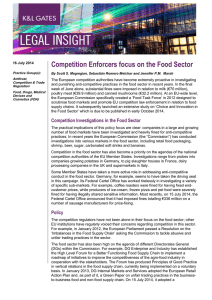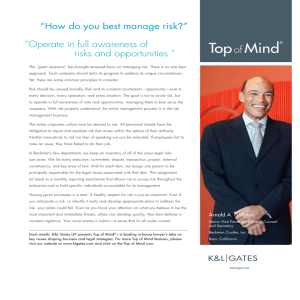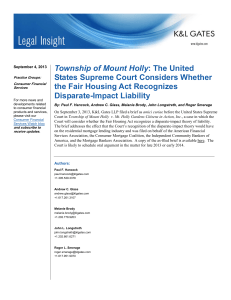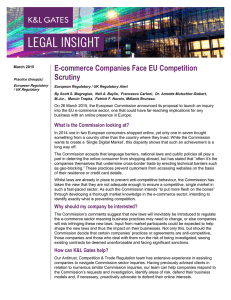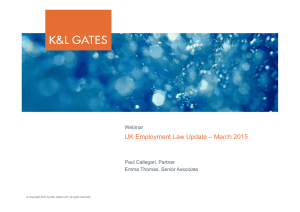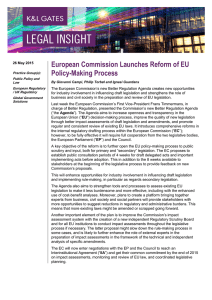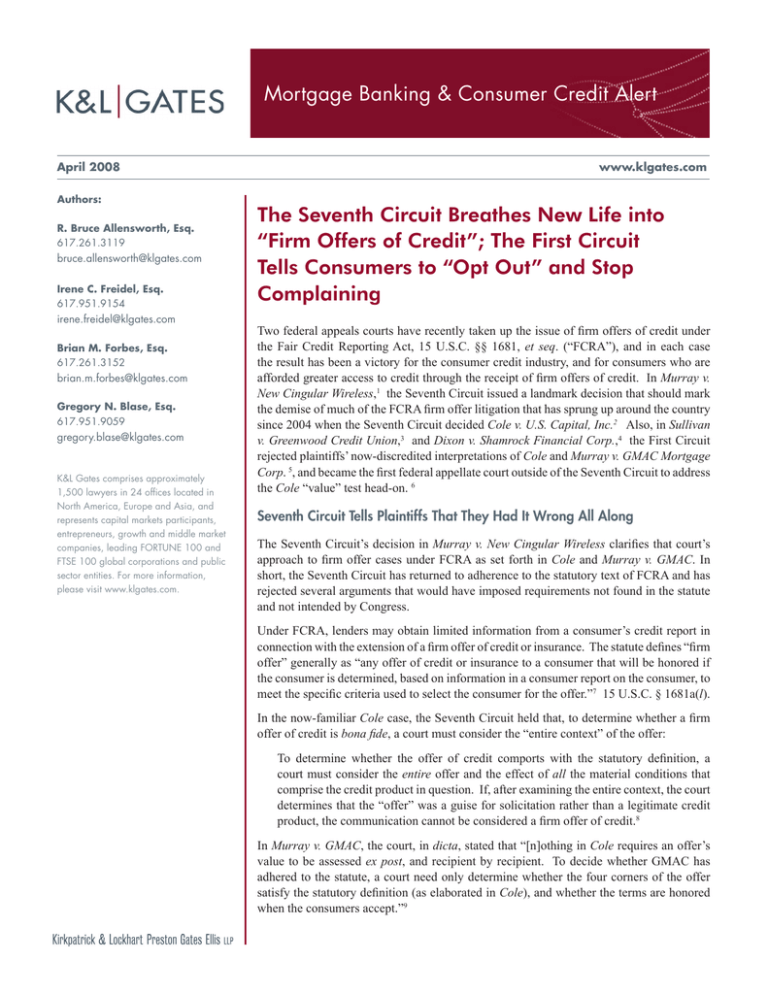
Mortgage Banking & Consumer Credit Alert
April 2008
Authors:
R. Bruce Allensworth, Esq.
617.261.3119
bruce.allensworth@klgates.com
Irene C. Freidel, Esq.
617.951.9154
irene.freidel@klgates.com
Brian M. Forbes, Esq.
617.261.3152
brian.m.forbes@klgates.com
Gregory N. Blase, Esq.
617.951.9059
gregory.blase@klgates.com
K&L Gates comprises approximately
1,500 lawyers in 24 offices located in
North America, Europe and Asia, and
represents capital markets participants,
entrepreneurs, growth and middle market
companies, leading FORTUNE 100 and
FTSE 100 global corporations and public
sector entities. For more information,
please visit www.klgates.com.
www.klgates.com
The Seventh Circuit Breathes New Life into
“Firm Offers of Credit”; The First Circuit
Tells Consumers to “Opt Out” and Stop
Complaining
Two federal appeals courts have recently taken up the issue of firm offers of credit under
the Fair Credit Reporting Act, 15 U.S.C. §§ 1681, et seq. (“FCRA”), and in each case
the result has been a victory for the consumer credit industry, and for consumers who are
afforded greater access to credit through the receipt of firm offers of credit. In Murray v.
New Cingular Wireless,1 the Seventh Circuit issued a landmark decision that should mark
the demise of much of the FCRA firm offer litigation that has sprung up around the country
since 2004 when the Seventh Circuit decided Cole v. U.S. Capital, Inc.2 Also, in Sullivan
v. Greenwood Credit Union,3 and Dixon v. Shamrock Financial Corp.,4 the First Circuit
rejected plaintiffs’ now-discredited interpretations of Cole and Murray v. GMAC Mortgage
Corp. 5, and became the first federal appellate court outside of the Seventh Circuit to address
the Cole “value” test head-on. 6
Seventh Circuit Tells Plaintiffs That They Had It Wrong All Along
The Seventh Circuit’s decision in Murray v. New Cingular Wireless clarifies that court’s
approach to firm offer cases under FCRA as set forth in Cole and Murray v. GMAC. In
short, the Seventh Circuit has returned to adherence to the statutory text of FCRA and has
rejected several arguments that would have imposed requirements not found in the statute
and not intended by Congress.
Under FCRA, lenders may obtain limited information from a consumer’s credit report in
connection with the extension of a firm offer of credit or insurance. The statute defines “firm
offer” generally as “any offer of credit or insurance to a consumer that will be honored if
the consumer is determined, based on information in a consumer report on the consumer, to
meet the specific criteria used to select the consumer for the offer.”7 15 U.S.C. § 1681a(l).
In the now-familiar Cole case, the Seventh Circuit held that, to determine whether a firm
offer of credit is bona fide, a court must consider the “entire context” of the offer:
To determine whether the offer of credit comports with the statutory definition, a
court must consider the entire offer and the effect of all the material conditions that
comprise the credit product in question. If, after examining the entire context, the court
determines that the “offer” was a guise for solicitation rather than a legitimate credit
product, the communication cannot be considered a firm offer of credit.8
In Murray v. GMAC, the court, in dicta, stated that “[n]othing in Cole requires an offer’s
value to be assessed ex post, and recipient by recipient. To decide whether GMAC has
adhered to the statute, a court need only determine whether the four corners of the offer
satisfy the statutory definition (as elaborated in Cole), and whether the terms are honored
when the consumers accept.”9
Mortgage Banking & Consumer Credit Alert
The Cole and Murray v. GMAC decisions unleashed
a tidal wave of class action lawsuits in the Seventh
Circuit and beyond, in which plaintiffs sought to
capitalize on the value test in ways that were not
supported by the language of FCRA or the Cole
decision itself. For example, from Cole and Murray
v. GMAC, plaintiffs have argued that the Cole value
test requires lenders to set forth every material term
of the credit offer in the initial mailer and that an offer
that is not capable of acceptance based on the terms
set forth in the mailer is not a firm offer of credit.
With its decision in Murray v. New Cingular Wireless,
the Seventh Circuit has now rejected many of these
arguments.
The case was a consolidated appeal of three firm
offer cases originating from district courts within the
Seventh Circuit. In the first of those cases, Murray v.
New Cingular Wireless,10 the district court held that
defendant’s offer of a free phone when customers
signed up for a wireless telephone contract was an
offer of “credit” under FCRA, and that the offer had
“value” under Cole.11 The district court also held
that the required disclosures were not “clear and
conspicuous” because they were printed in six-point
font, but that the violation was not willful under
FCRA, and, thus, plaintiff could not collect statutory
damages.12 In Bruce v. Keybank N.A.,13 the second
case on appeal, the district court held that defendant’s
offer of a mortgage loan was not a firm offer because
it lacked sufficient material terms to have value under
Cole.14 Yet, the district court ruled that the violation of
FCRA was not “willful.”15 Finally, in Price v. Capital
One Bank,16 the district court held that defendant’s
offer of a credit card was a firm offer even though
it did not disclose the credit limit on the card being
offered.17
On appeal, the Seventh Circuit first addressed the issue
of whether Cole requires a firm offer to “be valuable
to all or most recipients.”18 The Court opined that its
holding in Cole was intended for the limited purpose
of preventing merchants from obtaining consumer
credit information by making token offers of credit
in connection with an offer to sell merchandise.19
Next, the Court rejected plaintiffs’ contention “that
this approach must be applied, not only to distinguish
between offers of merchandise and offers of credit, but
also to decide whether even a simple offer of credit is
valuable.”20 The Court held that Cole was “beside the
point” because it was not intended to require “pure
offers of credit” to have “value.”21
Second, the Court rejected plaintiffs’ contention –
adopted by many district courts – that a firm offer
must contain material terms to comply with FCRA.
Confirming that Cole’s value test could not be used to
require loan terms to be included in a firm offer, the
Court stated that “[t]o the extent this argument rests on
Cole … it is wrong.”22 Next, the Court looked to the
statutory definition of “firm offer” and concluded that
nothing “in FCRA says that the initial communication
to a consumer must contain all the important terms that
must be agreed on before credit is extended.”23 The
Court reasoned that to hold otherwise would render
firm offers “turgid, and … uninformative” because
they would “be harder to read and grasp.”24
Third, on the issue of whether a creditor may vary
the terms of the offer after it is sent to the consumer,
the Court was less clear. Although the Court held
that an offer itself need not disclose credit terms,
the statute requires that a firm offer be honored if
the consumer continues to meet the criteria used to
select the consumer for the offer.25 Plaintiffs argued
that a lender’s reservation of the right to vary terms
violates FCRA because it would permit a lender to
deny credit even where a consumer meets the criteria
used to select him or her for the offer. For example, in
Bruce v. Keybank, Keybank’s offer stated that interest
rates and closing costs could vary and that “rates, fees,
and terms are … subject to change without notice.”26
The Court reasoned that this language may render
the offer illusory, as plaintiffs argued, or that it may
be reserving the lender’s statutory right to verify the
consumer’s creditworthiness when he responds to the
offer.27 Because the Court concluded that the answer
would require discovery, and plaintiffs did not seek
any discovery on this issue, they were not entitled
to relief under their theory.28 Nevertheless, the Court
appears to have left the door open to challenges where
an offer contains numerous qualifications such as the
ones that were at issue in Bruce v. Keybank.
Finally, the Court held that New Cingular Wireless
violated FCRA when it printed the required FCRA
disclosures in 6-point font.30 However, the Court
concluded that the violation was not “willful.” The
Court reasoned that when New Cingular Wireless
sent its offer to the plaintiff in 2003, the law was
April 2008 | 2
Mortgage Banking & Consumer Credit Alert
undeveloped and, thus, could not support a finding
that New Cingular acted recklessly in violating the
statute.31
The Seventh Circuit’s decision in Murray v. New
Cingular Wireless likely spells the end of the line
for the numerous FCRA firm offer class actions that
were filed in the wake of Cole and Murray v. GMAC.
The Seventh Circuit has soundly rejected arguments
advanced by plaintiffs that a firm offer of credit must
contain material terms and that it must be “valuable”
to consumers. Perhaps of most importance was the
Court’s ruling that the “value” test in Cole is only to
be used when “disentangling” sham offers of credit
from what the Court terms “pure offer” (i.e. offers
that are not a guise for pitching merchandise). The
question remains, however, whether viable claims are
possible where a lender’s offer states that terms may
be cancelled or varied at any time.
First Circuit To Consumers: “Opt Out” And
Stop Complaining
In a pair of opinions preceding the Seventh Circuit’s
Murray v. New Cingular Wireless decision by a
matter of days, the First Circuit upheld dismissals of
two firm-offer-of-credit class actions by adhering to
FCRA’s plain language. The First Circuit became the
first federal appellate court to address the value test
in the Seventh Circuit’s Cole opinion. The apparent
conflict between the two courts, however, quickly
evaporated upon the release of the Murray v. New
Cingular Wireless decision.
The First Circuit held that a firm offer of credit is
an offer that complies with the plain terms of the
definition of “firm offer of credit” set forth in FCRA.
Notably, neither of the firm offers at issue in Sullivan
and Dixon enumerated material loan terms such as a
definite loan amount, interest rate or repayment term.
For example, the Sullivan firm offer stated that the
plaintiff had been pre-approved to receive a home
loan of “up to 100% of the value of your home,” and
that plaintiff could call lender Greenwood to “secure
a great program.”32 The Dixon offer merely invited
plaintiff to contact lender Shamrock Financial to
learn how he could “save lots of money,” “pay off
revolving debt,” “refinance your mortgage balance,”
and increase plaintiff’s credit score by “100 points
or more.” Both offers contained notices advising the
consumer of the ability to opt out of receiving firm
offers of credit, and notifying plaintiff that the offer
was not guaranteed unless plaintiff met certain credit
and collateral criteria.34
In evaluating the offers at issue in these cases, the First
Circuit took a common-sense approach in holding that
the offers need only comply with the plain language
of FCRA. Specifically, the Court held that: (1) a firm
offer need not disclose particular loan terms; and (2)
it does not have to have “value” to a consumer beyond
what is required by the statute, that is, a guarantee
that the consumer will not be denied credit if he meets
the criteria set forth in the offer. The Court reasoned
that this was enough value to the consumer since the
lender extending the firm offer has only been given
a small amount of personal credit information, most
often just a FICO score.
In both decisions, the First Circuit rejected the oftmade argument that the term “firm offer of credit”
should be interpreted using common law principles of
contract law. The Court relied on a canon of statutory
construction that when a term is defined by the statute,
the Court should not look beyond that definition to
supply meaning to the term. The Court also noted
that the statutory definition of “firm offer of credit”
in FCRA sets forth requirements upon which a firm
offer may be conditioned.35 As the Dixon Court noted,
the statute’s definition of firm offer “excludes the
common law meaning of ‘offer’ because the FCRA
specifically permits lenders to impose post-offer
criteria that would be antithetical to the common law
understanding” of the term.36
Although the First Circuit did not expressly reject
Cole, its opinions cite Cole for the limited purpose of
supporting the notion that under FCRA a consumer’s
credit information can only be accessed for the
purpose of offering credit, rather than offering a
consumer product.37 In Sullivan, for example, the
Court distinguished the offer at issue – which was
unquestionably for a mortgage loan – from the offer
in Cole which amounted to a $300 coupon toward the
purchase of a used car. The question in Cole therefore
was whether there was an offer of credit at all, and the
First Circuit found that this issue was not present in
either Sullivan or Dixon because the offers in those
cases were clearly for credit.
To support its holding that a “firm offer of credit” need
not disclose material terms, the First Circuit contrasted
the detailed disclosure provisions found in the Truth
in Lending Act (“TILA”) with FCRA and “put into
context the limited purposes of” FCRA.38 The Court
April 2008 | 3
Mortgage Banking & Consumer Credit Alert
noted that, unlike FCRA, TILA was enacted “to
assure a meaningful disclosure of credit terms so that
the consumer will be able to compare more readily
the various credit terms available to him.”39 While
TILA requires the disclosure of, among other things,
the applicable finance charges and annual percentage
rates, those disclosure obligations are not required
until the consumer submits a loan application, i.e.,
“subsequent to a firm offer of credit.”40 Thus, the Court
concluded that because TILA was not implicated at the
firm offer stage and FCRA does not otherwise require
such disclosures, there was no requirement that the
defendants’ firm offers of credit provide material loan
terms.41
As the Sullivan Court noted, FCRA was enacted “to
ensure fair and accurate credit reporting, promote
efficiency in the banking system and protect consumer
privacy.”42 FCRA’s main thrust is directed at regulating
credit reporting by the major credit reporting agencies.
The required disclosures under FCRA are those
provided for in 15 U.S.C. § 1681m, and the plaintiff in
Sullivan did not allege any violation of that section.43
Finally, the First Circuit noted that the invasion of a
consumer’s privacy occasioned by the accessing of
portions of his or her credit report was balanced by
the benefits to consumers in having greater access
to credit “and by the presence of a safety-valve –
the ability of consumers to opt out of the practice
entirely ….”44 The remedy for the unwanted intrusion,
according to the First Circuit, is the opt-out provision,
not the courts.45
With the one-two punch of the First Circuit’s decisions
in Sullivan and Dixon and the Seventh Circuit’s
decision in Murray v. New Cingular Wireless, the
parade of firm offer of credit class actions that has
dogged the industry in recent years appears to have
reached the end of the road.46
April 2008 | 4
Mortgage Banking & Consumer Credit Alert
Endnotes
12 Id. at 793-794.
1 --- F.3d ----, 2008 WL 1701839 (7th Cir. April 16, 2008).
13 No. 2:05-CV-330, 2006 WL 3743749 (N.D. Ind.
Dec. 15, 2006).
2
389 F.3d 719 (7th Cir. 2004). For a more detailed discussion of Cole, and FCRA firm offer litigation generally,
see Developments in “Firm Offer” Litigation Under the
Fair Credit Reporting Act, The Review of Banking &
Financial Services, R. B. Allensworth, Irene C. Freidel,
Brian M. Forbes, Gregory N. Blase (February 2008); and
Decisions of Federal Courts Create Uncertainty Concerning
Use of Prescreened Offers of Credit: An Update on FCRA Prescreened Offer of Credit Class Action Litigation,
Mortgage Banking/Consumer Finance Alert, R. B. Allensworth, Steven M. Kaplan, Irene C. Freidel, Brian M. Forbes, Joshua C. Rowland (April 2006).
3 --- F.3d ---, 2008 WL 726135 (1st Cir. Mar. 19, 2008).
4 --- F.3d --- 2008 WL 902200 (1st Cir. April 3, 2008).
5 434 F.3d 948, 956 (7thCir. 2006).
6
In Kennedy v. Chase Manhattan Bank USA, NA, 369 F.3d 833 (5th Cir. 2004), a case that predated Cole, the Fifth
Circuit affirmed the dismissal of claims alleging that the
defendant violated FCRA when it sent plaintiffs
“preapproved” offers of credit and subsequently declined
to extend credit. The court relied exclusively on the
extensive statutory definition of “firm offer of credit” in the
statute, to conclude that the plaintiffs failed “to state a claim
under [FCRA] because [defendants’ preapproved
certificates] clearly establish that the respective offers
constitute firm offers of credit under [FCRA].” Id. at 841.
Summarizing its decision, the Fifth Circuit explained that a
“firm offer of credit” under FCRA “really means a ‘firm
offer if you meet certain criteria.’” Id.
7
FCRA further permits a firm offer of credit to be conditioned
on the consumer’s: (1) creditworthiness; (2) continued
ability to meet the credit criteria used to select the consumer
for receiving the firm offer; and (3) ability to furnish any
collateral that is required for the extension of credit or
insurance. 15 U.S.C. § 1681a(l)(1)-(3).
8
Cole, 389 F.3d at 726 (emphasis in original). Subsequently,
in Perry v. First Nat’l Bank, 459 F.3d 816 (7th Cir. 2006),
the Seventh Circuit upheld the district court’s determination
that a credit card offer was a firm offer under FCRA because
(1) it was clear the offer would be honored if accepted; (2)
the offer set forth the credit line and the interest rate; and (3)
the offer had value as an offer of credit.
9 434 F.3d at 956.
10 432 F. Supp. 2d 788 (N.D. Ill. 2006).
11 Id. at 791-792.
14 Id. at *4-5.
15 Id. at * 6.
16 No. 05-C-947,
May 22, 2007).
2007
WL
1521525
(E.D.
Wis.
17 Id. at *4.
18 Murray v. New Cingular Wireless, 2008 WL 1701839
at *1.
19 Id.
20 Id.
21 Id. at *2. The Court also held that New Cingular’s mailer
offering a free phone for anyone who signed up for a one year service plan was not a violation of FCRA. The Court
agreed with the district court’s reasoning that the wireless
telephone contract at issue was “credit” since the services
were provided in advance of payment, and that the offer of
a free phone did not bring the offer within the purview of
Cole’s value test. Id.
22 Id. at *3.
23 Id. at *4.
24 Id.
25 Id. at *3; 15 U.S.C. § 1681(l) (a firm offer is “any offer of
credit or insurance to a consumer that will be honored if the
consumer is determined, based on information in a consumer
report on the consumer, to meet specific criteria used to
select the consumer for the offer”).
26 Murray v. New Cingular Wireless, 2008 WL 1701839
at *4.
27 Id. at *5.
28 Id. at *4
29 In contrast to the Keybank offer, the court held that Capital
One’s omission of a minimum credit amount and maximum
interest rate on its mailer did not run afoul of FCRA. Id. at
*5. In that instance, the court determined that the lender
was merely reserving is right to verify the consumer’s
continued creditworthiness which it is permitted to do under
the statute. Id.
30 Id. at *6
31 Id. at *7
32 Sullivan, 2008 WL 726135 at *1.
33 Dixon, 2008 WL 902200 at *1.
April 2008 | 5
Mortgage Banking & Consumer Credit Alert
34 Sullivan, 2008 WL 726135 at *2; Dixon, 2008 WL 902200
at *1-2.
35 15 U.S.C. § 1681a(l)(1)-(3).
36 Dixon, 2008 WL 902200 at *4.
37 Notably, the Seventh Circuit has now reached the same
conclusion in Murray v. New Cingular Wireless.
38 Sullivan, 2008 WL 726135 at *4.
39 Id.
40 Id., citing Soroka v. JP Morgan Chase & Co., 500 F. Supp.
2d 217, 222 (S.D.N.Y. 2007) (rejecting Cole and granting
motion to dismiss FCRA firm offer complaint).
41 In any event, in comparing the two mailers, the Dixon Court
suggested that the Sullivan matter did contain a maximum
loan amount of “100% of the value of [plaintiff’s] home.”
Dixon, 2008 WL 902200 at *3, n.2.
42 Sullivan, 2008 WL 726135 at *3, quoting Safeco Ins. Co. of
Am. v. Burr, 127 S. Ct. 2201 (2007).
43 15 U.S.C. § 1681m; Sullivan, 2008 WL 726135 at *4.
44 Dixon, 2008 WL 902200, *5.
45 Id.
46 For example, within days of the First Circuit’s decision in
Sullivan, a federal court in Rhode Island dismissed a similar
firm offer lawsuit. See Dixon v. Calusa Investments, LLC,
No. 06-442-T, 2008 WL 821607 (D.R.I. March 27, 2008)
(dismissing FCRA firm offer class action in light of First
Circuit’s decision in Sullivan).
April 2008 | 6
Mortgage Banking & Consumer Credit Alert
K&L Gates’ Mortgage Banking & Consumer Finance practice provides a comprehensive range of transactional,
regulatory compliance, enforcement and litigation services to the lending and settlement service industry.
Our focus includes first- and subordinate-lien, open- and closed-end residential mortgage loans, as well as
multi-family and commercial mortgage loans. We also advise clients on direct and indirect automobile, and
manufactured housing finance relationships. In addition, we handle unsecured consumer and commercial
lending. In all areas, our practice includes traditional and e-commerce applications of current law governing
the fields of mortgage banking and consumer finance.
For more information, please contact one of the professionals listed below.
LAWYERS
Boston
R. Bruce Allensworth
Irene C. Freidel
Stephen E. Moore
Stanley V. Ragalevsky
Nadya N. Fitisenko
Brian M. Forbes
Andrew Glass
Phoebe Winder
bruce.allensworth@klgates.com
irene.freidel@klgates.com stephen.moore@klgates.com stan.ragalevsky@klgates.com nadya.fitisenko@klgates.com brian.forbes@klgates.com andrew.glass@klgates.com phoebe.winder@klgates.com
+1.617.261.3119
+1.617.951.9154
+1.617.951.9191
+1.617.951.9203
+1.617.261.3173
+1.617.261.3152
+1.617.261.3107
+1.617.261.3196
thomas.poletti@klgates.com
+1.310.552.5045
paul.hancock@klgates.com melissa.sanchez@klgates.com +1.305.539.3378
+1.305.539.3373
elwood.collins@klgates.com
steve.epstein@klgates.com
drew.malakoff@klgates.com +1.212.536.4005
+1.212.536.4830
+1.216.536.4034
jonathan.jaffe@klgates.com erin.murphy@klgates.com +1.415.249.1023
+1.415.249.1038
holly.towle@klgates.com +1.206.370.8334
costas.avrakotos@klgates.com melanie.brody@klgates.com eric.edwardson@klgates.com steven.kaplan@klgates.com phillip.kardis@klgates.com rebecca.laird@klgates.com larry.platt@klgates.com phil.schulman@klgates.com john.steele@klgates.com ira.tannenbaum@klgates.com nanci.weissgold@klgates.com kris.kully@klgates.com morey.barnes@klgates.com
+1.202.778.9075 +1.202.778.9203
+1.202.778.9387 +1.202.778.9204
+1.202.778.9401
+1.202.778.9038
+1.202.778.9034
+1.202.778.9027
+1.202.778.9489
+1.202.778.9350
+1.202.778.9314
+1.202.778.9301
+1.202.778.9215
Los Angeles
Thomas J. Poletti
Miami
Paul F. Hancock
Melissa Sanchez
New York
Elwood F. Collins
Steve H. Epstein
Drew A. Malakoff
San Francisco
Jonathan Jaffe
Erin Murphy
Seattle
Holly K. Towle
Washington, D.C.
Costas A. Avrakotos Melanie Hibbs Brody
Eric J. Edwardson Steven M. Kaplan
Phillip John Kardis II
Rebecca H. Laird
Laurence E. Platt
Phillip L. Schulman
H. John Steele Ira L. Tannenbaum
Nanci L. Weissgold
Kris D. Kully Morey E. Barnes
April 2008 | 7
Mortgage Banking & Consumer Credit Alert
David L. Beam
Emily J. Booth Krista Cooley
Anthony C. Green
Elena Grigera
David G. McDonough, Jr.
Lorna M. Neill
Staci P. Newman
Stephanie C. Robinson
Kerri M. Smith
Holly M. Spencer
Erin E. Troy
david.beam@klgates.com emily.booth@klgates.com krista.cooley@klgates.com anthony.green@klgates.com elena.grigera@klgates.com
david.mcdonough@klgates.com lorna.neill@klgates.com staci.newman@klgates.com stephanie.robinson@klgates.com kerri.smith@klgates.com holly.spencer@klgates.com erin.troy@klgates.com +1.202.778.9026
+1.202.778.9112 +1.202.778.9257
+1.202.778.9893
+1.202.778.9039
+1.202.778.9207
+1.202.778.9216
+1.202.778.9452
+1.202.778.9856
+1.202.778.9445
+1.202.778.9853
+1.202.778.9384
stacey.riggin@klgates.com +1.202.778.9202
Director of Licensing
Washington, D.C.
Stacey L. Riggin
Regulatory Compliance Analysts
Washington, D.C.
Dameian L. Buncum
Teresa Diaz
Jennifer Early
Marguerite T. Frampton
Robin L. Gieseke
Allison Hamad
Joann Kim
Brenda R. Kittrell
Dana L. Lopez
Jeffrey Prost
dameian.buncum@klgates.com teresa.diaz@klgates.com jennifer.early@klgates.com marguerite.frampton@klgates.com robin.gieseke@klgates.com allison.hamad@klgates.com
joann.kim@klgates.com brenda.kittrell@klgates.com dana.lopez@klgates.com jeffrey.prost@klgates.com +1.202.778.9093
+1.202.778.9852
+1.202.778.9291
+1.202.778.9253
+1.202.778.9481
+1.202.778.9894
+1.202.778.9421
+1.202.778.9049
+1.202.778.9383
+1.202.778.9364
K&L Gates comprises multiple affiliated partnerships: a limited liability partnership with the full name Kirkpatrick & Lockhart Preston Gates
Ellis LLP qualified in Delaware and maintaining offices throughout the U.S., in Berlin, in Beijing (Kirkpatrick & Lockhart Preston Gates Ellis
LLP Beijing Representative Office), and in Shanghai (Kirkpatrick & Lockhart Preston Gates Ellis LLP Shanghai Representative Office); a
limited liability partnership (also named Kirkpatrick & Lockhart Preston Gates Ellis LLP) incorporated in England and maintaining our
London and Paris offices; a Taiwan general partnership (Kirkpatrick & Lockhart Preston Gates Ellis) which practices from our Taipei office;
and a Hong Kong general partnership (Kirkpatrick & Lockhart Preston Gates Ellis, Solicitors) which practices from our Hong Kong office.
K&L Gates maintains appropriate registrations in the jurisdictions in which its offices are located. A list of the partners in each entity is
available for inspection at any K&L Gates office.
This publication/newsletter is for informational purposes and does not contain or convey legal advice. The information herein should not be
used or relied upon in regard to any particular facts or circumstances without first consulting a lawyer.
Data Protection Act 1998—We may contact you from time to time with information on Kirkpatrick & Lockhart Preston Gates Ellis LLP seminars
and with our regular newsletters, which may be of interest to you. We will not provide your details to any third parties. Please
e-mail london@klgates.com if you would prefer not to receive this information.
©1996–2008 Kirkpatrick & Lockhart Preston Gates Ellis LLP. All Rights Reserved.
April 2008 | 8

